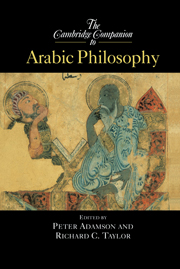Book contents
- Frontmatter
- 1 Introduction
- 2 Greek into Arabic
- 3 Al-Kindī and the reception of Greek philosophy
- 4 Al-Fāarābī and the philosophical curriculum
- 5 The Ismāīlīs
- 6 Avicenna and the Avicennian Tradition
- 7 Al-Ghazālī
- 8 Philosophy in Andalusia
- 9 Averroes
- 10 Suhrawardī and Illuminationism
- 11 Mysticism and philosophy
- 12 Logic
- 13 Ethical and political philosophy
- 14 Natural philosophy
- 15 Psychology
- 16 Metaphysics
- 17 Islamic philosophy and Jewish philosophy
- 18 Arabic into Latin
- 19 Recent trends in Arabic and Persian philosophy
- Select bibliography and further reading
- Index
4 - Al-Fāarābī and the philosophical curriculum
Published online by Cambridge University Press: 28 May 2006
- Frontmatter
- 1 Introduction
- 2 Greek into Arabic
- 3 Al-Kindī and the reception of Greek philosophy
- 4 Al-Fāarābī and the philosophical curriculum
- 5 The Ismāīlīs
- 6 Avicenna and the Avicennian Tradition
- 7 Al-Ghazālī
- 8 Philosophy in Andalusia
- 9 Averroes
- 10 Suhrawardī and Illuminationism
- 11 Mysticism and philosophy
- 12 Logic
- 13 Ethical and political philosophy
- 14 Natural philosophy
- 15 Psychology
- 16 Metaphysics
- 17 Islamic philosophy and Jewish philosophy
- 18 Arabic into Latin
- 19 Recent trends in Arabic and Persian philosophy
- Select bibliography and further reading
- Index
Summary
LIFE AND WORKS
The philosophy of al-Fārābī stands in marked distinction to that of al-Kindī but is no less representative of the major trends of thought inherited by the Islamic world. His tradition is consciously constructed as a continuation and refinement of the neo-Aristotelianism of the Alexandrian tradition, adapted to the new cultural matrix of the Near East. The Neoplatonic element of al-Fārābī ’s thought is most obvious in the emanationist scheme that forms a central part of his cosmology, though that scheme is much more developed than that of earlier Neoplatonists in its inclusion of the Ptolemaic planetary system. His theory of the intellect appears to be based on a close reading of Alexander of Aphrodisias and develops the concept of an Active Intellect standing outside the human intellect. Above all, al-Fārābī ’s legacy to later thinkers is a highly sophisticated noetics placed within a rigorous curriculum of instruction in Aristotelian logic. Fārābī was above all a systematic and synthesizing philosopher; as such, his system would form the point of departure on all the major issues of philosophy in the Islamic world after him.
The status accorded al-Fārābī’s intellectual legacy here stands somewhat at odds with what we can reconstruct of his life with any certainty. With the exception of a few simple facts, virtually nothing is known of the personal circumstances and familial background of al-Fārābī. The great variety of legends and anecdotes about this second major philosopher of the Islamic period is the product of contending biographical traditions produced nearly three centuries after his death.
- Type
- Chapter
- Information
- The Cambridge Companion to Arabic Philosophy , pp. 52 - 71Publisher: Cambridge University PressPrint publication year: 2004
- 6
- Cited by

